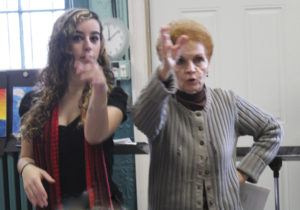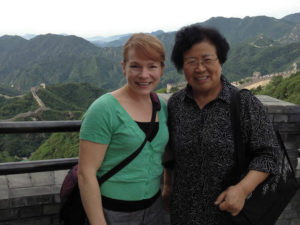Por El Dr T.J. Harper
“Inspirar la excelencia en la música coral a través de la expansión de nuestro alcance, para crear cambio social positivo, fomentar la comunidad y crear oportunidades para la próxima generación de líderes corales”.
Más allá de las fronteras de Estados Unidos, la música coral sigue creciendo y redefiniéndose a medida que continúa recibiendo información de las tradiciones culturales inherentes a una región así como de la pasión de individuos comprometidos activamente en su creación, su interpretación y su erudición. Por todo el mundo están emergiendo centros de música coral, reinventando y desafiando continuamente las nociones tradicionales sobre qué apariencia tiene y cómo suena la música coral. El Programa de Intercambio Internacional de Directores (en inglés, ICEP) de la ACDA (American Choral Directors Association, o Asociación Americana de Directores Corales) está dedicado a conducir al mundo en la creación de oportunidades de diálogo artístico e intercultural con estas comunidades corales procedentes de todo el mundo. Este diálogo es esencial para crear conexiones y forjar relaciones más sólidas entre la ACDA y el resto del mundo. El ICEP, un programa de intercambio en curso, está destinado a que líderes emergentes estadounidenses y sus homólogos internacionales interactúen con coros y músicos corales procedentes de sus respectivos países.
Fundada en 1959, la ACDA ha abogado siempre por la excelencia en la interpretación de la música coral. El núcleo de esta idea es la excelencia a través del educar, compartir y promover las mejores prácticas. El primer número del ACDA Choral Journal (revista coral de la ACDA) anunció la introducción formal de un programa de intercambio de música coral en el que se pudieran analizar y compartir ideas y métodos de enseñanza. En 1975, la ACDA añadió a su lista de propósitos oficiales el siguiente: fomentar y promocionar programas de intercambio internacional que involucren a grupos de intérpretes, a directores y a compositores. La adición de este lenguaje en el canon de los objetivos oficiales de la asociación marcó un momento decisivo en la profesión coral estadounidense, ya que reconoció a la comunidad global como a un socio crítico para favorecer el diálogo intercultural y ensanchar los horizontes artísticos.

Hace casi treinta años, la ACDA se embarcó en su primer proyecto oficial de intercambio internacional de directores, con Alemania, Suecia, Venezuela y Argentina como países socios. Este primer proyecto contó con la participación de algunos de los directores corales más conocidos de cada país. Después de estos intercambios internacionales de gran éxito, este programa no prosiguió durante muchos años, aunque las relaciones y colaboraciones internacionales continuaron en EE.UU. y en el extranjero. No obstante, estas asociaciones se limitaban a aquellos directores con deseos y medios de crear una experiencia internacional de éxito. Pasarían muchos años antes de que la ACDA diera prioridad a este tipo de programa de intercambio a nivel nacional para sus miembros.
En 2010, el Dr. Jerry McCoy —anterior presidente nacional— lideró, siguiendo el consejo del Dr. Tim Sharp —director ejecutivo de la ACDA—, un esfuerzo renovado que estableció un nuevo comité de dirección para un Programa de Intercambio Internacional de Directores y para cumplir el mandato oficial del propósito de 1975 de la ACDA. Este comité de dirección del ICEP tenía a cargo la creación de una visión, una serie de objetivos y un calendario para la implementación de esta iniciativa internacional. El comité estaba formado por directivos que representaban a las siete divisiones de la ACDA, y estaba regido por el Dr. James Feiszli, el Dr. Bruce Brown y el Dr. Jerry McCoy. En 2012, el Dr. T.J. Harper fue designado director nacional del Programa de Intercambio Internacional de Directores de la ACDA. Desde el lanzamiento de esta iniciativa en 2010, la ACDA ha organizado y ejecutado con éxito intercambios internacionales con Cuba en 2012, China en 2014, Suecia en 2015 y Corea del Sur en 2016. 2017 será testigo del intercambio ICEP más ambicioso hasta la fecha, con colaboraciones que abarcan desde Norteamérica (Canadá y Estados Unidos), Centroamérica (Costa Rica, Puerto Rico y México) y Sudamérica (Venezuela, Brasil y Argentina).

El Programa de Intercambio Internacional de Directores de la ACDA es un intercambio de directores «uno a uno» entre los países socios. Esto significa que por cada director seleccionado para participar de un país, se seleccionará un número idéntico de directores del país socio. Después, los directores consocios del ICEP (Conducting Fellows) seleccionados participarán en una estancia profesional que durará entre siete y catorce días. Cada estancia está diseñada para exponer a los directorios consocios a una vista general de la cultura coral del país anfitrión. En EE.UU., los directores visitantes internacionales (Visiting International Conductors, VIC) coordinan sus residencias profesionales bien con una conferencia de una división de la ACDA (días pares), bien con la Conferencia Nacional de la ACDA (días impares, es decir, 2017 en Mineápolis). Cada director consocio tiene que adquirir su propio pasaje de ida y vuelta, pero todos los gastos de alojamiento, comida y transporte son por cuenta del país anfitrión.
Uno de los resultados más significativos de esta iniciativa es el impacto percibido por las comunidades corales de todo el mundo tiempo después de haberse completado la estancia ICEP. Existen unos 90 antiguos alumnos del ICEP de la ACDA. Cada director consocio representa a cientos de coristas de su propia comunidad local y de sus organizaciones corales. Además, cada estancia ICEP representa la interacción, el aprendizaje y el intercambio intercultural con miles de coristas de todo el mundo. Las relaciones que se favorecen a través de este programa continúan construyéndose sobre sí mismas y formando el terreno fértil para la creación de nuevas asociaciones y colaboraciones más allá del alcance original de esta iniciativa.
En esencia, los directores consocios del ICEP son embajadores de buena voluntad para la profesión coral cuya visión principal es a la vez humanística y artística. En nombre de todos los que integramos la ACDA, estos directores estadounidenses están conectando a todos los miembros de sus propias comunidades cantantes con sus socios internacionales. La influencia de este programa se hace exponencial. Como resultado de estas estancias internacionales iniciales de la ACDA, los antiguos alumnos del ICEP están creando nuevas oportunidades de colaboración y diálogo significativo más allá de las fronteras del intercambio original. Además, los antiguos alumnos del ICEP están comenzando a trabajar juntos para explorar las maneras en que está usando la gente la música coral para crear un cambio social positivo, promover el bienestar mental y fomentar la comunidad. A través del Programa de Intercambio Internacional de Directores y de sus actividades relacionadas, se les proporciona a nuestros miembros numerosas oportunidades de contactar directamente con directores, coros, repertorio y tradiciones corales de todo el mundo.
El Dr. T.J. Harper es jefe del Departamento de Música, profesor asociado de Música y director de Actividades Corales del Providence College, en Providence, Rhode Island, EEUU. También es director del Programa de Intercambio Internacional de Directores de la ACDA. Correo electrónico: harper.tj@gmail.com
Traducido del español por Sigfrido Martín, España
Revisado por Juan Casabellas, Argentina

